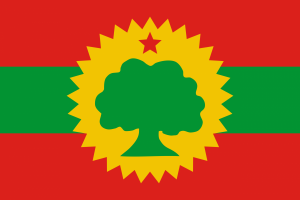Language/Borana-arsi-guji-oromo/Grammar/Pronouns
Hi Borana-Arsi-Guji Oromo learners! 😊
In this lesson, we will be learning about pronouns in Borana-Arsi-Guji Oromo grammar. Pronouns are words that replace or refer to a noun previously mentioned in a sentence or a previous one. For example, instead of saying "Mariam went to Mariam's house", we can say "Mariam went to her house", where "her" replaces "Mariam".
Once you've mastered this lesson, take a look at these related pages: Conditional Mood, Plurals & Give your Opinion.
Subject Pronouns[edit | edit source]
Subject pronouns are used as the subject of a sentence. In Borana-Arsi-Guji Oromo, the subject pronouns are:
| Borana-Arsi-Guji Oromo | Pronunciation | English |
|---|---|---|
| Ana | [ʔaːna] | I/me |
| Nama | [nama] | we/us (inclusive) |
| Gama | [ɡama] | we/us (exclusive) |
| Sana | [sana] | you |
| Iya | [ija] | he/him |
| Sira | [sira] | she/her |
| Tana | [tana] | they/them |
Here's an example dialogue:
- Person 1: Ana aysan duula. ([I am not working.])
- Person 2: Sana aysan duula? ([You are not working?])
Object Pronouns[edit | edit source]
Object pronouns are used as the object of a sentence. In Borana-Arsi-Guji Oromo, the object pronouns are:
| Borana-Arsi-Guji Oromo | English |
|---|---|
| mini | me |
| nama | us (inclusive) |
| gama | us (exclusive) |
| sina | you |
| iya | him |
| sira | her |
| tana | them |
Here's an example dialogue:
- Person 1: Iya aysan dara. ([He sees me.])
- Person 2: Sira aysan dahra. ([She sees her.])
Possessive Pronouns[edit | edit source]
Possessive pronouns are used to indicate possession of something. In Borana-Arsi-Guji Oromo, the possessive pronouns are:
| Borana-Arsi-Guji Oromo | Pronunciation | English |
|---|---|---|
| Ifi | [iɸi] | my/mine |
| nama | [nama] | our/ours (inclusive) |
| gama | [ɡama] | our/ours (exclusive) |
| Sifi | [sifi] | your/yours (singular) |
| Iifi | [iɸiː] | his/hers |
| Sufi | [sufi] | their/theirs |
Here's an example dialogue:
- Person 1: Nan nama jirata. ([This is our house.])
- Person 2: Ifi jiraa. ([This is my house.])
Reflexive Pronouns[edit | edit source]
Reflexive pronouns are used to refer back to the subject. In Borana-Arsi-Guji Oromo, the reflexive pronouns are:
| Borana-Arsi-Guji Oromo | English |
|---|---|
| Sifan | myself |
| nametti | ourselves (inclusive) |
| gametti | ourselves (exclusive) |
| Sinan | yourself |
| iyan | himself/herself |
| siran | herself |
| tanan | themselves |
Here's an example dialogue:
- Person 1: Ana kallatti hambaluun fira. ([I washed myself.])
- Person 2: Sina intalli hambalaa jiran. ([You washed yourself well.])
Interrogative Pronouns[edit | edit source]
Interrogative pronouns are pronouns used to ask questions. In Borana-Arsi-Guji Oromo, the interrogative pronouns are:
| Borana-Arsi-Guji Oromo | English |
|---|---|
| ani/ana/iska anadhu? | Who? |
| qanu | What? |
| ani/ana/kabaja/kamiti/lafa/nefa | Which? |
| wonni | Where? |
| maqa | When? |
| haqaa/hanqaa | Why? |
| kore | How? |
| mannitti | How many? |
Here's an example dialogue:
- Person 1: Wonni itti yaada? ([Where do you remember?])
- Person 2: Mana jirata. ([I remember at home.])
I hope this lesson has been helpful in understanding Borana-Arsi-Guji Oromo pronouns. To improve your Borana-Arsi-Guji Oromo Grammar, you can also use the Polyglot Club website. Find native speakers and ask them any questions!

